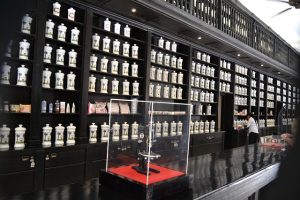How is the future as a pharmacist – what path to choose?
Together with Pharmacist Marius Chereches, we explore some of the possibilities that a graduate of the University of Medicine and Pharmacy can experience throughout his professional career. About Marius you can find more ideas and tips in the interview given here (https://pharmapro.ro/sfaturi-pentru-tinerii-farmacisti-interviu-cu-un-farmacist-farm-marius-chereches/).
I’ll graduate from the pharmacy faculty and I will be a pharmacist. What’s next?
This is a question that the pharmacy students ask right after being admitted in the pharmacy university or, after completing the 3rd year and they come into contact with pharmacist’s responsibilities.
The simple answer is: you will be a pharmacist and that’s very good! Everyone sees there are many pharmacies and thinks you will have a choice and you will have a very beautiful life, at least professionally. And, at large, it may be very true.
The pharmacy faculty is very tough. I have finished two faculties and I can say that the Pharmacy University was much more difficult than the Law University. Theoretically, the Pharmacy University teaches you everything you need to know about the medicine. In fact, it teaches you much and far too little.
If you’re a conscientious student, like most of the pharmacy students, you’ll know extraordinary well about chemistry, botany, and plant stuff. Instead, you’ll want to learn more about the patient (both the medical and human part).
A great advantage of a pharmacist’s profession is that, he is the only complete specialist in medicinal products, and that he can follow many paths after graduation.
-
Working within a pharmacy

First, the one you will most likely be prepared for is working within a community or hospital pharmacy. The bad news is that for this you are the least trained. Contact with the real world can be brutal and I have seen many eminent graduates who have lost themselves in the crowd, in an obscure pharmacy, and have not capitalized sufficiently their special work during the faculty. So I have seen many graduates with smaller grades during their student period who have managed to make a special appearance and input in the pharmacy, beyond their teachers’ expectations. Why is that happening? Probably not everyone that knows everything about medicine is able to interact with the public and work with the patient, as it is perfectly possible for a weaker student to have more talent in human relationships. Unfortunately, most students are of the opinion that working in the community pharmacy is about preparing the prescriptions. 60-70% of the community pharmacy work is about about human relationships. The rest is about pharmacology. There are few pharmacies that have complete recipe activity, and the majority who have recipe activity do this occasionally. Most of the time the pharmacist is in touch with the patient. The patient must be understood, listened to, counseled, and for this some social skills and a lot of pharmacology knowledge are needed. There is still the need for a lot of patience, the ability to endure various humiliations from a sometimes hysterical audience and the bureaucratic authorities disconnected from their mission.
The second option for a graduate, similar to the first, would be to work in a hospital pharmacy. Do not think we’re talking about the clinic pharmacy. This would be a very interesting option that the pharmacist would have to pay attention to the hospital activity at the patient’s bed. The hospital pharmacist deals with the release of the required medication to the hospital. It does not require very good pharmacology knowledge, nor will you interact with the patient, but you will have the opportunity to see the latest drug news, you will be tested for organizational capacity, you will interact with hospital doctors and can be very interesting especially if you will end up occupying a hospital pharmacy management position. It is a very interesting position for people with an organizational spirit and those who are curious to learn more about new drugs and treatment schemes used in the hospital.
- Working in the manufacturing of medicines

The pharmacist from the production site is another option for the pharmacy graduates. In the production of drugs, the pharmacist can occupy positions within the production departments, quality control or quality assurance. If you liked the pharmaceutical technology and chemistry, that’s the right place for you. This knowledge is very necessary here. I would also add organizational capacity and discipline, attention to detail and compliance with the procedures. There are several well-organized and respected manufacturing factories in Romania. Your greatest satisfaction will be to see your medicines produced by the company you work with, on the pharmacy shelf.
- Working in the distribution of medicines
In Romania at this time there are over 400 wholesale units authorized by the National Medicines and Medical Devices Agency. Each medicines wholesaler needs at least one pharmacist to function according to the legal requirements. You will find your calling and be involved in managing a pharmaceutical warehouse as a chief pharmacist or acting as person in charge of maintaining the quality management system, engaging in staff training programs, coordinating drug withdrawal operations, solving complaints, ensuring self-audit at regular intervals, ensuring compliance with all additional requirements imposed by art. 790 lit. b) of Law no. 95/2006, as amended and supplemented. and so on (in accordance with the responsibilities of the responsible person mentioned in the Guide of 17 June 2015 on good practice of wholesale distribution of medicines).
-
Working in a pharma company/pharmaceutical branch

Manufacturers, both with factories in Romania and those with offices here, need specialists in regulatory affairs, medicines dealers in Romania, and relations with regulators. It is a beautiful work that combines a lot of knowledge (chemistry, pharmacology, pharmaceutical technology) and it is for those who like the details, access to new information about medicines. The Medicines Agency is a European authority and does not cause the same trauma as other bureaucratic institutions.
In a pharmaceutical company, you can opt for several types of positions:
- Medical representative
- Regulatory Affairs Officer
- Pharmacovigilance Responsible
- Marketing and medical communication
On the research side there are also opportunities that can be explored in the department of clinical trials.
-
Working in the academic environment
For those who are attracted by the academic environment, the university environment can represent the direction of the development of their careers. Depending on the individuality of each person’s personality, choosing one discipline or another, they can choose to stay at the chair and develop new generations of students. The didactic activity follows a long period of professional accumulations in the scientific research, documenting, analyzing, evaluating and transferring the results of its own and collective scientific research.
These are the main options for the graduate from the pharmacy university.
How to choose?
It would be best to use the summer practice periods so you can see with your eyes how to work in a community or hospital pharmacy and have a first feeling whether you like it or not. In many centers there are pharmacies that hire students in the pharmacy starting with year 3. They will ask you to take receptions and arrange the medicines on the shelf. This is no problem because you will have the opportunity to see what is the dynamics in the pharmacy – how it is organized, how hard it is to stand 6-7 hours a day and go for 6-7 km per day from the front of the pharmacy looking and the medication, see how are patients react, etc.
Then, it would be a good idea to do a little introspection – what do you like about the faculty? If you like medical disciplines and work with the patient, you can choose your community pharmacy. If you like more chemistry and pharmaceutical technology, try the industry. There is also the category of people who like research.
Then choose to continue your university career and immediately sign up for a PhD. Good teachers are needed for future generations of pharmacists.
Thank you for the interest shown! If you find this useful, interesting, or inspirational interview, I invite you to leave your comments below or here.
For other interviews and inspirational pills, join the health professionals community, follow us on our website or on our Facebook page.
ANYONE CAN BE AN INSPIRATION FOR OTHERS! WE WANT TO KNOW YOUR STORY!








It’s a way to open our eyes and tremendous way.
Thankfully
Mihir
[…] The pharma industry offers numerous opportunities for developing a career. Here are some of the reasons we think you should consider when searching for a job in this area. If you need more guidance you also read 5 opportunities to develop your career as a pharmacist HERE. […]